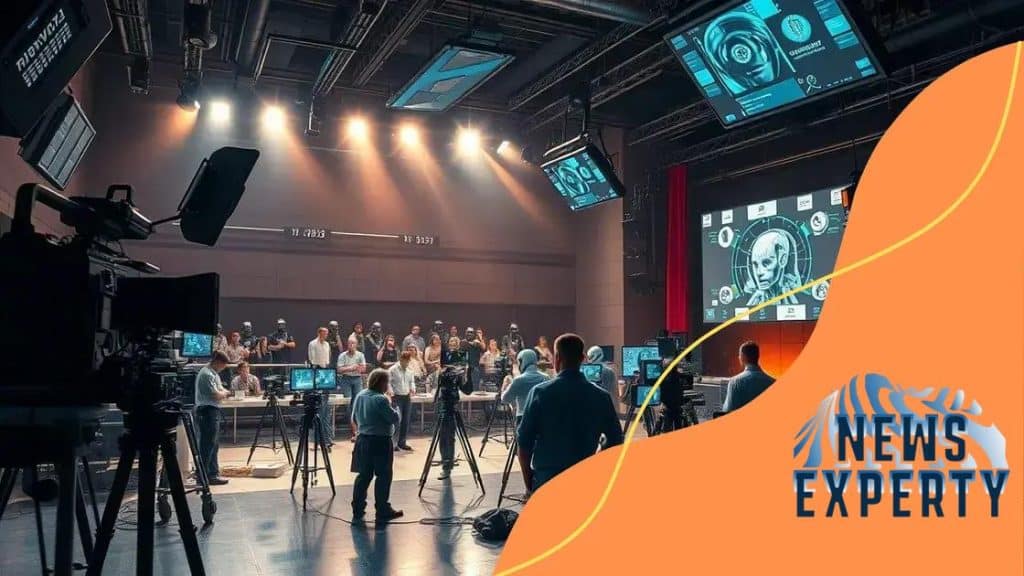How AI is transforming the entertainment industry

Anúncios
AI is transforming the entertainment industry by enhancing creative processes, providing personalized content recommendations, and creating immersive user experiences while also presenting challenges like data privacy and algorithm bias.
How AI is transforming the entertainment industry is a fascinating journey that reshapes our cultural landscape. From movie recommendations to scriptwriting, AI technologies are enhancing creativity and tailoring experiences like never before. Curious about how these innovations impact your favorite shows or films?
Anúncios
The role of AI in content creation
The role of AI in content creation is changing how writers, filmmakers, and artists produce their work. With advanced algorithms, AI assists in generating ideas, crafting scripts, and even composing music. As these technologies evolve, they open new avenues for creativity and innovation.
Enhancing Creativity
AI acts as a powerful tool for enhancing creativity. Writers can use AI to brainstorm plots or character ideas. This can lead to unexpected twists in storytelling. For film producers, AI can analyze audience preferences to predict what types of content will resonate most.
Script Generation
One significant application of AI is in script generation. By analyzing existing scripts, AI can suggest dialogue or scenarios. This allows creators to explore different narrative paths they might not have thought of before.
Anúncios
Benefits of AI in Content Creation
- Improves efficiency, saving time in the brainstorming phase.
- Offers data-driven insights into audience preferences.
- Encourages experimentation with new storytelling techniques.
Moreover, the use of AI can lead to personalization in content creation. For instance, streaming services often leverage AI to recommend shows and movies tailored to individual preferences. This not only helps users find content they will enjoy but also drives engagement by keeping them on the platform longer.
The technology even extends to areas like visual art. AI can generate images based on specific themes or styles, allowing artists to collaborate with machines in creating stunning visuals. This interplay between human creativity and artificial intelligence is reshaping artistic boundaries.
As we look into the future, the role of AI in content creation will only expand. With ongoing advancements, we can expect richer, more engaging experiences in the world of entertainment. The partnership between human creativity and AI will pave the way for innovations that we have yet to imagine.
How AI influences viewer engagement
How AI influences viewer engagement is a key element in today’s digital landscape. AI uses data to analyze viewer preferences and behaviors, transforming how content is delivered. This technology helps creators craft personalized experiences that keep audiences coming back.
Understanding Viewer Preferences
AI analyzes large amounts of data to understand what viewers like. It studies their watching habits and interactions with content. This data is then used to suggest shows or movies that align with their interests, enhancing their experience.
Personalized Recommendations
One of the most significant impacts of AI is in personalized recommendations. Streaming services use AI algorithms to create tailored lists for users. This not only helps viewers discover new content but also ensures they stay engaged with the platform.
Enhancing Interactivity
- AI provides interactive content that allows users to engage actively.
- Viewers can choose different story paths in shows or films.
- Gamification elements create an immersive experience.
Additionally, AI helps in creating content that resonates better with audiences. By analyzing which themes and genres are trending, filmmakers can adapt their strategies. This ensures that what they produce aligns with current viewer demands.
AI also plays a role in enhancing social media engagement. Platforms use AI to curate content feeds that keep users interested. By delivering relevant content, they increase the time users spend interacting with their services.
As AI continues to evolve, its influence on viewer engagement will become even more profound. With cutting-edge technology, creators can explore imaginative ways to connect with their audiences. Ultimately, this leads to richer and more satisfying viewing experiences for everyone involved.
AI’s contribution to personalized recommendations

AI’s contribution to personalized recommendations plays a crucial role in how we consume media today. By utilizing complex algorithms, AI analyzes user behavior to provide tailored content suggestions that keep viewers engaged. This ensures a more satisfying experience as users discover new shows or movies that match their unique tastes.
Data Collection and Analysis
The first step in creating personalized recommendations involves data collection. AI systems gather data from various sources, such as viewing history, user ratings, and even search queries. By analyzing this information, AI can identify patterns in user preferences.
Creating Tailored Lists
Once the data is processed, AI generates personalized content lists. These lists often include:
- Suggested series based on previous views.
- Movies that share similar genres or themes.
- New releases that match viewer interests.
These tailored suggestions help users explore content they might not have considered otherwise.
Moreover, AI adjusts recommendations based on real-time behavior. If a viewer suddenly starts watching a different genre, the algorithm quickly adapts to suggest similar content. This adaptability enhances user satisfaction by continuously refining the recommendations.
In addition to entertainment, personalized recommendations benefit users in various fields, including e-commerce and news. For example, online retailers suggest products based on past purchases, while news platforms curate articles aligned with users’ interests. This ensures that users receive the most relevant content possible, no matter the platform.
As technology advances, we can expect even more sophisticated recommendation systems that further enhance user experiences. AI-driven personalization will become the standard, creating an engaging and tailored environment for content consumption.
Challenges of AI in entertainment
Challenges of AI in entertainment present significant hurdles, even as the technology offers many benefits. While AI enhances creativity and personalization, it also raises concerns that need to be addressed for effective integration into the industry.
Data Privacy Concerns
One major challenge involves data privacy. AI systems rely on vast amounts of user data to function effectively. This can lead to issues related to the security and privacy of personal information. Users often worry about how their data is collected and used, which can affect their willingness to engage with AI-driven platforms.
Quality Control
Another obstacle is maintaining quality control. As AI attempts to automate content creation, there’s a risk that the output could lack the emotional depth and nuance of human-created content. Striking a balance between automation and human creativity is essential for delivering high-quality entertainment.
Algorithm Bias
- AI systems can inadvertently perpetuate biases present in the training data.
- This can lead to unfair representations of certain groups in content.
- Addressing algorithm bias is critical for promoting diversity and inclusivity.
Furthermore, the rapid pace of technological change means that the industry continually faces challenges. Keeping up with evolving algorithms and ensuring that they align with audience expectations is a constant struggle for creators.
Despite these challenges, many in the entertainment field are optimistic about AI’s future. By addressing these issues head-on, the industry can leverage AI’s potential while safeguarding user interests and maintaining high standards in content quality.
The future of AI in the entertainment industry
The future of AI in the entertainment industry looks promising and dynamic. As technology advances, AI is expected to play an even greater role in shaping the way we create, distribute, and consume content. This evolution will not only enhance user experiences but also streamline operations for creators.
Enhanced Storytelling
One area where AI will shine is in enhanced storytelling. With tools that can analyze audience preferences, writers can create narratives that better resonate with viewers. AI can suggest plot twists or character arcs based on what has worked well in the past, making stories more engaging.
Content Creation Automation
Automation will continue to rise in content creation. AI can assist in generating scripts, designing visuals, and even composing music. This shift allows creators to focus more on the artistic aspects while leaving repetitive tasks to machines. Automation can significantly save time and resources, making production processes more efficient.
Innovative User Experiences
- AI will drive more immersive experiences, such as virtual reality and augmented reality.
- User interactions will become even more personalized.
- Engagement will be enhanced through interactive storytelling techniques.
Moreover, AI’s potential to offer personalized content will be a game-changer. Streaming services will continue to refine their algorithms, providing recommendations that align closely with individual tastes. This tailored approach will keep audiences engaged and satisfied.
As AI technology continues to evolve, we can also expect ethical conversations to arise. Industry leaders will need to address issues like transparency and fairness in content creation. This proactive approach will be crucial in ensuring that AI benefits everyone involved.
Overall, the entertainment industry stands on the brink of an exciting transformation fueled by AI. As creators and technologists collaborate, the possibilities for innovation seem limitless, making the future fully captivating for both audiences and creators alike.
The future of AI in the entertainment industry is bright and full of possibilities. As technology advances, we can expect significant improvements in content creation, personalization, and audience engagement. By embracing AI responsibly, creators can enhance their storytelling, making experiences more immersive and enjoyable. While challenges exist, the collaboration between human creativity and AI will drive innovation, making entertainment more accessible and tailored to individual tastes.
FAQ – Frequently Asked Questions about AI in the Entertainment Industry
How is AI enhancing the creative process in entertainment?
AI provides tools that help creators brainstorm ideas, analyze scripts, and even generate music, making the creative process more efficient.
What role does AI play in content personalization?
AI analyzes viewer data to recommend content tailored to individual preferences, improving user engagement and satisfaction.
What challenges does the entertainment industry face with AI?
Key challenges include data privacy concerns, maintaining content quality, and addressing algorithm bias that can affect the representation of diverse groups.
How can creators ensure ethical use of AI in entertainment?
Creators should prioritize transparency in data usage and actively work to minimize biases in algorithms to create fair and inclusive content.





